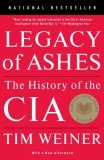Summary | Excerpt | Reviews | Beyond the Book | Readalikes | Genres & Themes | Author Bio

Critics' Opinion:
Readers' Opinion:
First Published:
Jun 2007, 448 pages
Paperback:
May 2008, 832 pages
 Book Reviewed by:
Book Reviewed by:
Amy Reading
Buy This Book
Like the American public, the agency dissented at its peril during the Vietnam War. Like the American press, it discovered that its reporting was rejected if it did not fit the preconceptions of presidents. The CIA was rebuked and scorned by Presidents Johnson, Nixon, Ford, and Carter. None of them understood how the agency worked. They took office “with the expectation that intelligence could solve every problem, or that it could not do anything right, and then moved to the opposite view,” notes a former deputy director of central intelligence, Richard J. Kerr. “Then they settled down and vacillated from one extreme to the other.”
To survive as an institution in Washington, the agency above all had to have the president’s ear. But it soon learned that it was dangerous to tell him what he did not want to hear. The CIA’s analysts learned to march in lockstep, conforming to conventional wisdom. They misapprehended the intentions and capabilities of our enemies, miscalculated the strength of communism, and misjudged the threat of terrorism.
The supreme goal of the CIA during the cold war was to steal Soviet secrets by recruiting spies, but the CIA never possessed a single one who had deep insight into the workings of the Kremlin. The number of Soviet spies with important information to reveal–all of them volunteers, not recruits—could be counted on the fingers of two hands. And all of them died, captured and executed by Moscow. Almost all had been betrayed by officers of the CIA’s Soviet division who were spying for the other side, under Presidents Reagan and George H. W. Bush. Under Reagan, the CIA set off on misconceived third–world missions, selling arms to Iran’s Revolutionary Guards to finance a war in Central America, breaking the law and squandering what trust remained reposed in it. More grievously, it missed the fatal weakness of its main enemy.
It fell to machines, not men, to understand the other side. As the technology of espionage expanded its horizons, the CIA’s vision grew more and more myopic. Spy satellites enabled it to count Soviet weapons. They did not deliver the crucial information that communism was crumbling. The CIA’s foremost experts never saw the enemy until after the cold war was over. The agency had bled the Soviets by pouring billions of dollars of weapons into Afghanistan to help fight the Red Army’s occupying forces. That was an epic success. But it failed to see that the Islamic warriors it supported would soon take aim at the United States, and when that understanding came, the agency failed to act. That was an epochal failure.
The unity of purpose that held the CIA together during the cold war came undone in the 1990s, under President Clinton. The agency still had people who strove to understand the world, but their ranks were far too thin. There were still talented officers who dedicated themselves to serving the United States abroad, but their numbers were far too few. The FBI had more agents in New York than the CIA had officers abroad. By the end of the century, the agency was no longer a fully functioning and independent intelligence service. It was becoming a second–echelon field office for the Pentagon, weighing tactics for battles that never came, not strategies for the struggle ahead. It was powerless to prevent the second Pearl Harbor.
After the attacks on New York and Washington, the agency sent a small skilled cadre of covert operators into Afghanistan and Pakistan to hunt down the leaders of al Qaeda. It then forfeited its role as a reliable source of secret information when it handed the White House false reports on the existence of weapons of mass destruction in Iraq. It had delivered a ton of reportage based on an ounce of intelligence. President George W. Bush and his administration in turn misused the agency once proudly run by his father, turning it into a paramilitary police force abroad and a paralyzed bureaucracy at headquarters. Bush casually pronounced a political death sentence upon the CIA in 2004 when he said that the agency was “just guessing” about the course of the war in Iraq. No president had ever publicly dismissed the CIA that way.
Excerpted from Legacy of Ashes by Tim Weiner Copyright © 2007 by Tim Weiner. Excerpted by permission of Doubleday, a division of Random House, Inc. All rights reserved. No part of this excerpt may be reproduced or reprinted without permission in writing from the publisher.





The House on Biscayne Bay
by Chanel Cleeton
As death stalks a gothic mansion in Miami, the lives of two women intertwine as the past and present collide.

The Flower Sisters
by Michelle Collins Anderson
From the new Fannie Flagg of the Ozarks, a richly-woven story of family, forgiveness, and reinvention.

The Funeral Cryer by Wenyan Lu
Debut novelist Wenyan Lu brings us this witty yet profound story about one woman's midlife reawakening in contemporary rural China.
Your guide toexceptional books
BookBrowse seeks out and recommends the best in contemporary fiction and nonfiction—books that not only engage and entertain but also deepen our understanding of ourselves and the world around us.